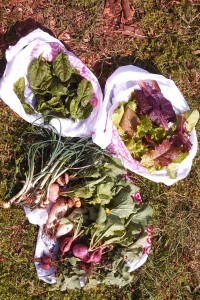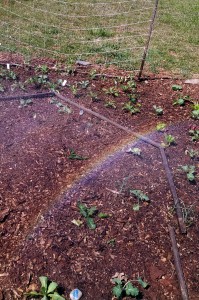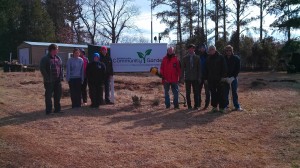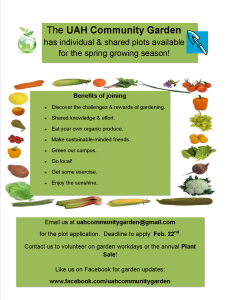The Campus as Text is a new blog feature to try and look at some of the happenings and peoples and places and events around campus. A sort of way to keep track of the oral history of the campus, if you will, but also a way to just meet some of the people that make this place interesting.
My guest this month is Becca Chambers, a senior in Biology who is working with the UAH Community Garden as the Garden Manager. She has agreed to answer some questions and to help give a broader picture of the project.
Thank you for being my space monkey on this one. First off, since you are one of my oldest friends, what would you say to naysayers who cry foul nepotism over this article?
Um. Perhaps we’re guilty of that, but it’s for a good cause?
Good answer. More seriously, tell us a brief overview of the community garden. What is it? Who is it for?
Mind if I quote the Community Garden’s mission statement?
Our Community Garden provides a space for education and discussion around the environmental, social and economic aspects of food systems and sustainability. Providing a forum for learning about the importance of consuming local and organic foods in a sustainable manner. It is a fun and practical application of environmentally friendly management many students have encountered in the Earth Systems Science program. The students participating are increasing the ecological literacy of the university and promoting environmentally responsible practices. Students, faculty and the community are all welcome to join in. It is the first garden in a variety of sustainable initiatives at UAH.
What is the history of the project? Has this been going on for a bit?
The project started in 2011. It was largely established through the hard work of Claire Herdy, an Earth System Science graduate student, and it has already quadrupled in size since its humble beginnings. It has had connections to the ESS Department, the Green Club, and the Biology Department. You can read about the garden’s first three seasons and see some lovely photos on Claire’s blog, which has functioned as the community garden website: http://esscommunitygarden.wordpress.com/ The garden has largely subsisted on generous donations, volunteer effort, and the earnings from the annual Plant Sale, held each April.
What are the big plans for the Community Garden this year? Anything fun?
Dr. Leland Cseke has always been a big part of the garden and is teaching a fun, hands-on class called BYS 302 People, Plants, and the Environment, in which students learn about plants and soil in the classroom, then have the opportunity to put their knowledge to work in their own garden plots. I believe the class is now in it’s third year.
Sadly, there have been some setbacks in the garden recently, including the fact that all of the founding gardeners have moved on. So, the big plan for this year is simply ensuring that the garden continues to grow, after all the hard work that was put into establishing it. We’re recruiting new gardeners, getting the word out about the garden, and taking a variety of security measures to ensure that our resources stay safe.
What can people who help out with the garden hope to accomplish? To learn? What would you say to people interested in it?
People who just have a little time to volunteer on a workday can help to create a green space on campus and learn a bit about sustainability and food production. Or by helping with the Annual Plant Sale (either volunteering or buying your plants there), they can learn the advantages of growing heirloom varieties and help a worthwhile campus project thrive. Everyone who gets involved can use the garden as a place to make friends and enjoy being outside.
You can “like” the garden on Facebook to show your support and get updates: https://www.facebook.com/uahcommunitygarden
What about people who want to join (i.e., use a garden plot for the season)? Whom should they contact?
Anyone can sign up for a plot, even beginner gardeners (although they may want to think about sharing a plot with a friend, since it’s a bit of a commitment). Gardeners can become part of a dialogue about organic gardening and food systems, make friends with other plant-lovers, enjoy the shared effort, AND grow (and eat!) their own organic produce, which has a number of benefits, including being pesticide-free, local, and better-tasting.
People who want to get involved with the garden can contact uahcommunitygarden@gmail.com I can add you to our email list for the garden workdays and the Plant Sale, send you an application for a plot, or answer any questions! Please note that the deadline to apply for a plot is February 22nd, 2014. [emphasis Doug’s]
Blue sky imagination time, what would be the optimal outcome for this project?
Claire wrote a very detailed Vision for the garden that has a lot of great ideas… In addition to diversifying garden activities, the garden could also increase in magnitude – there’s a huge field out there, we’re only using a fraction of it. So, the garden definitely has room to grow, but I think it’s a success if we just get a few people talking about where their food comes from and how it’s grown, or if even a dozen students learn something about gardening.
Some of Claire’s ideas for expansion include
- Composting – multiple methods
- Raised bed/square foot gardening
- Individually and departmental managed plots/beds
- Herb garden
- Garden seedlings and other plants housed in the campus greenhouse
- Rain water collection feeding into a drip irrigation system
- Mushroom cultivation(in the woods just behind greenhouses)
- ESSA club workshops and lectures
- Space for educational field trips
Finally, what is one way the community garden could work with the library and vice versa?
Gardening requires some amount of planning, and the library is the perfect place to do some research – for example, a quick search of the library database produces reference materials, books, academic journal and periodical articles about: compost, dealing with pests and weeds in an organic garden, permaculture, how to attract bees and other pollinators, soil health, planting tips, etc. (Note that one of the benefits of being part of a community garden is that knowledge is shared, so one need not be an expert in all of these topics!)
Library staff or students who spend too much time in the library might enjoy some sunshine and exercise out in the garden!
Thank you, again, Becca, for taking the time for this interview.
As a final Doug note, if you would like to suggest a person, place, event, or organization for an upcoming The Campus as Text, then contact me at doug.bolden@uah.edu and let me know!




